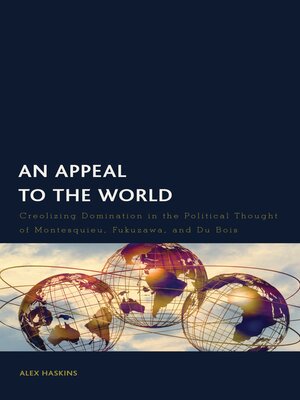An Appeal to the World
ebook ∣ Creolizing Domination in the Political Thought of Montesquieu, Fukuzawa, and Du Bois · Creolizing the Canon
By Alex Haskins

Sign up to save your library
With an OverDrive account, you can save your favorite libraries for at-a-glance information about availability. Find out more about OverDrive accounts.
Find this title in Libby, the library reading app by OverDrive.



Search for a digital library with this title
Title found at these libraries:
| Library Name | Distance |
|---|---|
| Loading... |
An Appeal to the World: Creolizing Domination in the Political Thought of Montesquieu, Fukuzawa, and Du Bois reconstructs how three distinguished political philosophers challenged transnational domination-namely, forms of arbitrary political and economic control across national borders-through distinct, but comparable, philosophical frameworks geared toward a range of global contexts.
For Montesquieu, despotic formulations remain the most alarming kinds of domination but can effectively be resisted through an emphasis on contextualized forms of moderation. Fukuzawa's key concern with domination centers on dependent relations but can be resisted through an emphasis on contextualized forms of independence. Du Bois, for his part, remains primarily concerned with domination as it manifests in discriminatory ontologies, and he challenges these through an emphasis on contextualized solidarity and self-determination.
An Appeal to the World creolizes these authors' reflections through three cases on Egypt, China, and England that feature across each author's writing, highlighting both shortcomings of each thinker's conclusions and how, collectively, they offer a more circumspect approach to resisting transnational domination. In so doing, An Appeal to the World challenges and seeks to conceptually and methodologically move beyond transnational good governance and developed/developing frameworks that continue to bedevil international organizations in the present.
For Montesquieu, despotic formulations remain the most alarming kinds of domination but can effectively be resisted through an emphasis on contextualized forms of moderation. Fukuzawa's key concern with domination centers on dependent relations but can be resisted through an emphasis on contextualized forms of independence. Du Bois, for his part, remains primarily concerned with domination as it manifests in discriminatory ontologies, and he challenges these through an emphasis on contextualized solidarity and self-determination.
An Appeal to the World creolizes these authors' reflections through three cases on Egypt, China, and England that feature across each author's writing, highlighting both shortcomings of each thinker's conclusions and how, collectively, they offer a more circumspect approach to resisting transnational domination. In so doing, An Appeal to the World challenges and seeks to conceptually and methodologically move beyond transnational good governance and developed/developing frameworks that continue to bedevil international organizations in the present.







